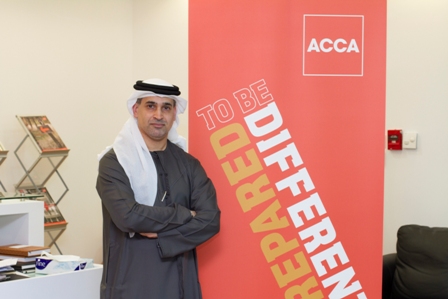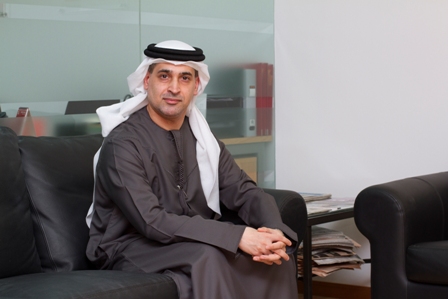ACCA UAE Advisory Committee Chairman Ahmad Darwish tells Joyce Njeri how the professional body is re-positioning itself to appeal to today’s youth, ‘who are always connected and clicking’

As the Chairman of the UAE’s ACCA Advisory Committee, Ahmad Darwish is tasked with the responsibility of representing members’ views to ACCA’s Global Council.
AS THE most senior member of the committee advising the Association of Chartered Certified Accountants (ACCA) in the UAE, Ahmad Darwish’s passion for the profession is clear for all to see.
Ahmad fervently travels the world promoting the activities, benefits and opportunities offered by the global body for professional accountants, to practitioners and students interested in a career in accountancy.
“Recently I participated in the ACCA International Assembly held in the UK, as the first and only UAE national to attend the prestigious gathering, where heads of all the global offices met with the governing body of ACCA and were able to contribute to the wider strategy of the association,” Ahmad proudly says.
Transformation in accountancy
The assembly meets every year to chart the way forward and provide delegates with a platform to give their input on important issues of strategic global importance to ACCA.
In an interview with Accountant Middle East, Ahmad does not mince words when talking about the current transformation sweeping across accountancy and finance sectors, saying change in the industry is overdue.
“The face of accounting has changed and its role in businesses has become much more complex,” he says, adding “More has to be done to rebuild investor trust, particularly after the global financial crisis and the aftermath of ugly events following WorldCom, Enron and Arthur Andersen scandals.”
“For an industry that stubbornly continues to operate the same way even after the turn of the century, it is incumbent upon us, as the major stake holders, to revamp and overhaul the profession, in order to reflect the needs of today’s changing job market.”
“We need to start right from the classroom. This means changing the accountancy education curriculum to bridge the gap between the job skills and what is taught in the classroom. Currently, the accounting curricula are largely focused on preparing students for careers in public accounting, however, they also need to have a breadth and depth of knowledge of all areas of accountancy, with an understanding of all the links in the finance chain.”
Fascination with numbers
Ahmad works as Manager, Management Accounting, at DP World, a conglomerate of international marine terminal operations, logistics and related services. The Group is a subsidiary of Dubai World, a global holding company that focuses on the strategic growth areas of transport, logistics, drydocks, maritime, investment and financial services.
“I like working the numbers; I have had an interest in data and statistics since my early school days. As a young boy I was always fascinated by numbers that whenever I would solve a mathematical problem that initially seemed too hard a nut to crack, I would have that feeling of immense accomplishment,” he narrates.
“The good thing about being an accountant is that one can workacross all sectors of the economy, not just financial services – including the public services, manufacturing, medical, education, media, government and other service functions of public sector organisations.
“Similarly, with the ACCA qualification recognised by employers around the world, there are many international opportunities within this profession,” he said.
“I take great pride as an Emirati national that our leader His Highness Sheikh Mohammed bin Rashid Al Maktoum has always inculcated the importance of education and acquisition of professional skills within our respective careers. So when I was through with my Undergraduate studies I sought to add more value to my skills, and that is when I decided to pursue accounting, through the ACCA, in the UK.”
“Having the ACCA designation gives one an added edge over other qualifications. For instance, after the recent global financial meltdown, many accountants took up other roles within the sector. Competition was fierce among graduates and professionals who were joining the ranks, as employers were looking for more than just the degree. They were looking for the necessary skills and experience, including the general all round business interest and knowledge, commercial awareness and also good communication skills, which I believe the ACCA qualification provides.”
“Accountants are increasingly having an impact on the direction of those businesses, rather than just analysing data and presenting it to management. This new emphasis on strategic and advisory role means that it is now more important than ever for accountants to have a deep working knowledge of management and the general understanding of the business environment,” he said.
United by shared commitment
As the Chairman of the UAE’s ACCA Advisory Committee, Ahmad is tasked with the responsibility of representing members’ views to ACCA’s Global Council to enable it to set and implement the body’s direction and strategy.
He has been with ACCA since it was established in the country.
“Upon the completion of my studies in the UK, I returned to the UAE and continued to be heavily involved in ACCA, by supporting and helping in the development and promotion of its qualification in the country. We opened a fully fledged ACCA office in Dubai, from where we also serve all the other Emirates,” he says.
Recently, the Faculty formed a members’ advisory committee and held an election, where Ahmad was elected as chairman, to steer the board to the next growth phase.
“My role as Chairman has given me that added impetus to develop the profession here in the UAE as well as in the region. During the recent ACCA international assembly held in the UK, the international assembly delegates had the opportunity to meet with the International Accounting Standards Board (IASB) Chairman – Hans Hoogervorst, where we discussed the need for the IASB and Islamic Finance industry to work together.”
“As you are aware Islamic Finance is growing across the globe and therefore as experts in this field we have to act fast to ensure that we develop a guide that harmonises both Islamic and conventional reporting standards.”
Islamic accounting standards
Recently, ACCA in collaboration with KPMG released a study that calls on the IASB to consider issuing guidance on the application of International Financial Reporting Standards (IFRS) when accounting for certain Islamic financial products which are offered by both Islamic financial institutions and conventional banks.
“The IASB should work with the Accounting and Auditing Organisation for Islamic Financial Institutions (AAOIFI) and other leading Islamic finance standard setters and regulators globally to establish the gaps between IFRS and Islamic accounting standards and to review the needs of users. This should also include a review of terminology used in IFRS, and consider whether such sensitive terms as ‘interest’ – forbidden in all forms in Islamic banking- can be amended or added to,” the research states.
According to Ahmad, ACCA is repositioning itself to become a digital organisation, to align with the needs of today’s generation, “which we like to refer to as the ‘Generation C’, as [the youth] is always connected and clicking.”
Few Emirati graduates

CAREER HIGHLIGHT: “The good thing about being an accountant is that one can work across all sectors of the economy, not just in financial services,” Ahmad says.
Ahmad also lamented about the relatively small number of Emirati graduates entering the accountancy employment market. In this regard, he revealed that ACCA has lined up programmes where officials will visit various colleges and universities, to reach out to Emirati youth.
“We hope that letting top officials meet Emirati students can help the learners picture themselves more in accountancy. Local nationals are hungry for opportunities. In the past we have had graduates joining the government ranks in their numbers but we want them to join the private sector as well.”
The outspoken ACCA Chairman didn’t however, sugar-coat their prospects. He admitted that many local nationals get intimidated by the sheer requirements of the subject.
“Understanding accounting is vital for one’s job prospects; however, this critical knowledge requires dedication and hard work,” he says.
Acquiring ACCA membership is a rigorous process that requires one toundertake training and the ACCA qualification, which includes passing 14 exams, completing three years relevant practical work experience and also completing an online ethics module.
“Despite its heavy requirements, ACCA programmes equip students with all these necessary skills required in today’s competitive job market,” Ahmad adds.
“But this does not give graduates a straight employment ticket. One of the main difficulties students face is having the relevant experience that is needed to successfully enter that profession. Therefore gaining experience through volunteer work, networking, part time work or work placementgives one a good advantage that reflects commitment to a career and demonstrates you have key employability skills,” he advises.
“The finance sector is vast and covers many areas including accountancy, banking, actuary, audit and advisory, insurance, pensions, taxation, among others and there are many possible directions students can take, whether they want to work for one of the big accountancy firms, or for a high street firm.”
Qualification for Arab professionals
The ACCA Chairman also revealed that plans are underway to design an accounting qualification that suits the needs of the Arab society.
Acknowledging that all certifications available at the moment are foreign, he said there was urgent need to have an accredited professional certificate that provides Arab accountants with the highest qualifications and one that is recognised globally.
At the moment, there is a certification that is awarded to professional accountants in the region. The Arab Certified Professional Accountant (ACPA) qualification was developed by the Arab Society of Certified Accountants (ASCA), in collaboration with a group of consultants from ACCA, European Commission, the Institute of Chartered Accountants of Scotland (ICAS), and the International Federation of Accountants (IFAC), among others.
The ACPA curriculum consists of four subjects including business, accounting, auditing and regulations.
“Discussions are ongoing to develop a curriculum for local and regional professional accountants. This will guarantee us the same respect accorded to other peers, when we come together to push the agenda of the Arab World, during international forums that discuss important industry matters such as standards, governance and ethics,” Ahmad said.












